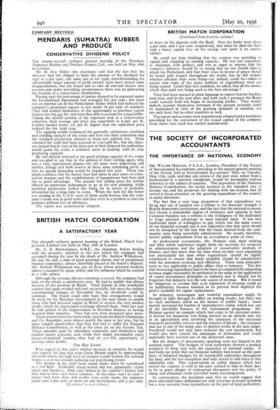BRITISH MATCH CORPORATION
A SATISFACTORY YEAR TiE eleventh ordinary general meeting of the British Match Cor- poration Limited was held on May 18th in London.
Mr. C. E. Bartholomew, O.B.E., the chairman, before dealing with the accounts, referred to the loss which the be company had sustained during the year by the death of Mr. Andrew Williamson. He was, he said, a man of great personal charm, and of exceptional business experience, always cheerfully placed at the board's disposal. Mr. Andrew Williamson was one of those whose personal modesty almost concealed his great ability and the influence which he exerted in a wide sphere.
Although the revenue did not constitute a record, the company had had, on the whole, a satisfactory year. He had to qualify that phrase because of the position in Brazil. Their friends in that wonderful country had again worked well and successfully, but since the sudden constitutional changes of November last, no dividends could be remitted. The board could only hope that arrangements would be made by the Brazilian Government in the near future to enable those who had invested capital in Brazil to receive the very modest profits which the depreciated exchange allowed them. Only last year he had spoken of the improvement in Brazilian finances as having lessened their anxieties. They had now been increased once more.
Their returns from the home trade, and from the British Dominions and the Argentine, were almost exactly the same as last year, but he must remind shareholders that they had had to suffer the National Defence Contribution, as well as the extra 3d. on the Income Tax. Those amounts paid by subsidiary companies and themselves had totalled nearly k50,000, and, while they might presumably enjoy increased national security, they had no possible opportunity of earning extra profits.
THE RED LIGHT.
With regard to this year's further increase in taxation, he would only express his fear that even Great Britain might be approaching the point where the high level of taxation 'would weaken the national finances, as it was already reducing our purchasing power.
The decline in the yield from stamp duties must be considered as a red light. Artificially cheap money did not, apparently. create much new business. Only once before in the country's history had they had to bear such heavy taxation. At the time-1917 to 1922— money had been dear, and profits were easily made, the taxpayer could earn 6 per cent. or more on safe investments, and 3 per cent. (Continued in next column.)
BRITISH MATCH CORPORATION (Continued from previous column.)
or more on his deposits with the Bank. Now his limits were about 4 per cent. and i per cent. respectively, and when he died the State took a heavy capital levy on his savings and spent it on current outlays.
He could not help thinking that the country was spending its - capital and crippling its earning capacity. He was not concerned, as chairman, with politics, and was as eager as anyone that the country's defences should be so strong that no one should dare to attack the Homeland, and that their voice in favour of peace should be heard with respect throughout the world, but he did wonder whether efficient steps were being—or, indeed, could be—taken to ensure that some of the many millions of expenditure were not being wasted. Could they feel confident, he asked, that all the money which they paid was being used to the best advantage ?
They had been warned in plain language to expect heavier burdens next year, and in the year after, and with such a prospect the Board could scarcely hold out hopes of increasing profits. They would, indeed, account themselves fortunate if the present revenues could be maintained in view of the growing demands of taxation, not not only here, but in other countries as well.
The report and accounts were unanimously adopted and a resolution providing for the conversion of the issued capital of the company from shares into stock was carried unanimously.


















































 Previous page
Previous page